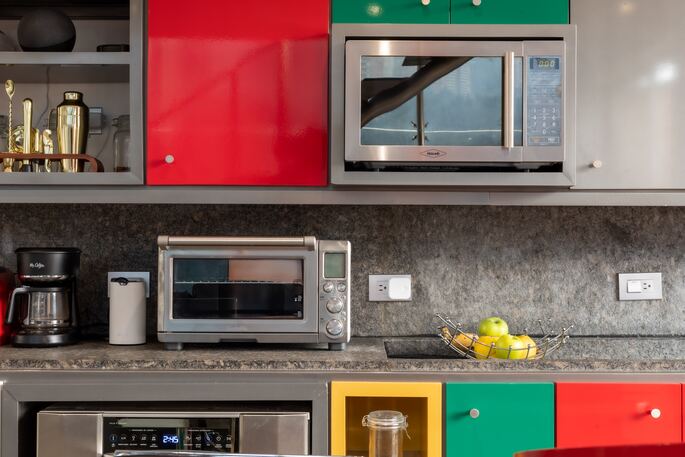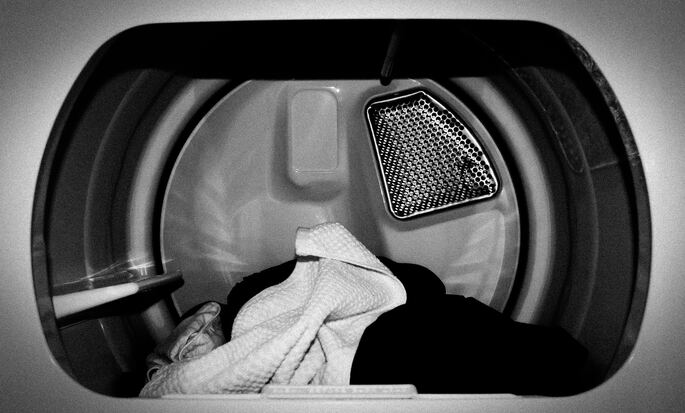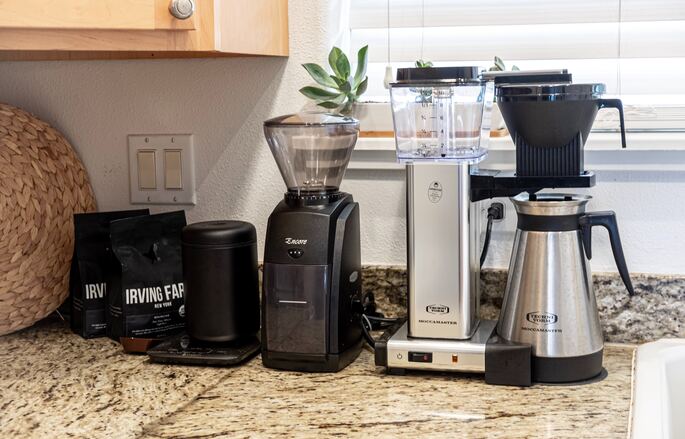Home renovations come with a lot of trash. If you have an older property, you may have inherited some outdated appliances. These bulky items can’t go out with your usual trash, and improper disposal of an old refrigerator or water heater can have unintended negative consequences on the environment. Landfill pollution, e-waste, and resource depletion impact everyone. Taking the extra time and effort for responsible appliance disposal and removal helps us all in the long run.
Proper disposal can also save you money, as there are fines that come with illegal dumping. Selling metal to a scrap yard may even help you earn a little extra cash. Learn more about how to correctly get rid of old appliances when renovating your house or flipping a property.
The importance of appliance disposal
You can’t throw just anything in the trash. Like special drop-off sites for medical waste, paint cans, and household chemicals, there are places where you should take old appliances. Improper disposal can result in chemicals leaking into the groundwater or microplastics finding their way into the soil. The average American eats about a credit card’s worth of plastic each week. It’s important to try and mitigate the negative environmental impact we’re making on our own health and the health of future generations.
Environmental impact
Both large and small appliances can contain hazardous materials. Items like refrigerators, freezers, air conditioners, and dehumidifiers may contain chlorofluorocarbons – or CFCs. CFCs are harmful chemicals that deplete the ozone layer and have been banned in recent years. They may still be present in some older appliances. Improper disposal of appliances can result in the release of other hazardous substances, like used oil, mercury, or polychlorinated biphenyls. PCBs have no taste or smell and have been detected in soil, water, and sediments. Low levels of PCBs have even found their way into the food chain.
Most appliances are made of a combination of metal and plastic that can’t be broken down with regular trash that gets collected each week. Even if you’re throwing away a small appliance, like a fan or toaster, you shouldn’t throw it in with the regular trash. There are ways to properly process these items to minimize their impact on our air, water, and soil. Reducing pollution is just one benefit of responsibly disposing of appliances.
Social and economic consequences
In addition to health and environmental damages, improper disposal also impacts people economically. Poorer communities are more likely to live near landfills and suffer more directly from pollution. Scrap yards, specialized recycling centers, and manufacturers all offer recycling options for appliances. If these programs are underutilized, they risk being scrapped, causing job loss in some communities. When these programs are shut down, proper appliance recycling becomes less accessible, starting the whole pollution cycle all over again.
Legislation and regulations
In the United States, there are many disposal bans and mandatory recycling laws to follow. California is one of the states with stricter regulations surrounding recycling and household chemicals. Be sure to check your local jurisdiction to ensure you follow the proper guidelines.
Most waste collection services have their own websites. Check out your service provider’s site to learn more about how to dispose of unusual items. There may be numerous locations for different recycling options, like glass recycling sites, scrap metal yards, and household chemicals, as well as large household appliances. If you’re caught disobeying these laws and regulations, you may be faced with fines or even potentially jail time. Enforcement of trash laws can be difficult, but it’s better for you and the planet to simply follow local guidelines. Tip: Recycling can be confusing for many people, as different materials have different recycling requirements depending on local facilities and regulations. A recycling identifier could help quickly determine whether an item is recyclable and how it should be sorted.

How to ensure that your appliances last
The best thing you can do is take care of your appliances so they last a long time. By maximizing the lifespan of your appliances, you’ll minimize the amount of trash that gets sent out into the world. Remember, when you throw something away, it doesn’t really go away. Everything you throw in the trash winds up somewhere, and when it comes to appliances, it’s best to make sure they wind up in the right spot. Learn more about how to have a greener lifestyle when it comes to appliances.
Proper usage
Operating a refrigerator or an oven may seem obvious, but browsing the owner’s manual provides helpful tips. The user manual details how to properly use and protect your appliances from damage. It also shows you simple things like how to properly clean the range or how often to defrost the freezer.
Regular maintenance
In addition to cleaning, it can’t hurt to call a handyman for some routine maintenance. This can be especially helpful in extending the lifetime of large appliances, like central AC units or water heaters. You can handle some routine maintenance on your own. Replacing air filters, deep cleaning ovens, and cleaning under and around your refrigerator are all simple things you can do to keep your appliances running smoothly. Set a reminder in your calendar to stay on track.
Upgrading or repairing when necessary
If you plan on staying in your home for 15 years or more, it may be a good investment to upgrade old appliances. Sometimes, repairs and routine maintenance simply won’t cut it, and you’ll have to get rid of an old appliance. If you’re staying in the home for fewer than 15 years, try to repair any issues first. Sometimes, paying for a replacement part can keep an appliance going for a few more years. Plus, you’ll save money replacing just a part versus the whole appliance.
Options for disposing of old appliances
Depending on the condition of the appliance in question, you may be able to donate or sell the appliance instead of recycling it. Here’s how to pick the best option for waste reduction through responsible appliance disposal.
Donation
If your refrigerator, window AC unit, or other appliance is still in good working condition, consider donating it. Donating old appliances to charity for responsible disposal is a great option if you’re remodeling and getting rid of appliances that may not match your aesthetic.
By donating usable appliances, you’ll avoid creating unnecessary waste and help others save money when they pick up your used appliance. Some donation centers specialize in furniture and appliances. Do your research and select the organization that best suits your needs before making a donation.
Selling
If you need extra money for your home remodel, you may want to sell your old appliances. This is okay so long as the appliance is in good working order. If it needs minor repairs, be upfront about that in the listing. Some people don’t mind a little project.
Before you post the appliance to social media markets, make sure you have good-quality photos of the appliance. Clean off any grease, dirt, and dust, and provide relevant information in the listing. Buyers will want to know the dimensions, power source, and age of the appliance.
Recycling
There are a number of recycling options for large and small appliances. The manufacturer may have a specific recycling program they use for their products. Best Buy stores offer recycling for electronics. By selecting the appropriate recycling center or program, you’ll keep your old appliances out of the landfill and prevent harmful chemicals from leaking into the atmosphere.
Keep in mind that although small appliances like juicers, curling irons, or toasters may fit in your recycling bin, they can’t be processed with paper, cardboard, and aluminum cans. Check your local guidelines and ordinances to find recycling centers for your old appliances.

Waste disposal services
If you’re not able to move the appliance yourself, you can schedule a pickup with a waste disposal service. These services specialize in responsible appliance removal and disposal. Your neighborhood or city may also have special disposal events. Spring cleanup events are especially popular. Take advantage of these opportunities to clean out your house.
Hazardous waste disposal
If you’re renovating or remodeling a property, you’ll probably have plenty of household chemicals to throw out. Just like there are eco-conscious options for getting rid of old appliances, there are safe ways to get rid of things like wood stains, paint thinner, and even old paint.
Your local waste removal service website is an incredibly valuable resource. Most sites will direct you to the proper place to throw out these items. In most cases, you can also get rid of household cleaners and medical waste at these sites.
Some appliances, like refrigerators, come with hazardous materials and heavy metals. When you send a refrigerator to the proper disposal site, they’ll remove the chemicals from the fridge and send them to a separate facility. The refrigerator gets broken down and the materials get sent to the right facility for processing.
Preparation for appliance disposal
Once you’ve decided to get rid of an appliance, there are a couple of things you should do before you proceed with the disposal.
Cleaning the appliance
If you plan on recycling the appliance by selling or donating it, take some time to clean it out. This is important for refrigerators because dust, cooking grease, and food waste can carry germs and other contaminants.
Wipe down the exterior of the appliance as best you can. Make sure there’s no trash or other unnecessary materials in the appliance. It’s important that whoever’s moving the appliance is able to handle it safely.
Removing personal information
When most people think about identity theft, they worry about their cell phones or computers. Plenty of smart appliances on the market have access to your private information. There are smart refrigerators now – and if they connect to wifi, they might be tracking more than your grocery list.
If you’re donating an appliance or electronic device with your personal information, make sure to wipe the device clean before handing it over. Cleaning up your personal data prevents future owners of the appliance from getting your information.
Detaching removable parts
If you can safely and easily remove the exterior cord from your refrigerator, go ahead and do so. These days, most large and small appliance parts can be recycled. Still, if something is removable and might fall during transport, it’s a good idea to remove it before the waste collectors pick it up.
Don’t try to break down an old refrigerator by yourself. Remember, these appliances contain dangerous chemicals. The professionals at the recycling site can safely handle it.

Donating or selling old appliances
If you decide to donate or sell your old appliances, there are a few different ways to go about it.
Finding the right organization or buyer
There are many nonprofits, churches, and community thrift stores happy to take your appliance off your hands. Check their website or reach out to the organizer to see what kinds of items are accepted.
When selling, it may be tempting to let your item go to the first person who shows interest. If you’re in a hurry, that might be your best option. Still, take some time to make sure the appliance will fit in the buyer’s home and that the home has the appropriate power source. If you’re selling to someone you met online, have someone with you when they come to pick up the appliance or hire a professional delivery service to handle the final transaction.
Evaluating the condition of the appliance
If your appliance still works, you may be able to donate or sell it. However, if the appliance in question is very old and behind current energy standards, it’s actually more irresponsible to reuse it than to dispose of it.
Older appliances that aren’t up to code release more emissions and drain more energy. If you’re uncertain about the age and condition of an appliance, consider hiring a handyman or inspector to take a look. If it’s not worth the expense, it may be better to responsibly dispose of the appliance instead.
Preparing the appliance for donation or sale
The cleaner, the better. Wipe everything down, get rid of old cooking grease and dust, and use the appropriate cleaner to remove germs. Delete any personal information from smart appliances before the appliance goes to a new home. Detach any removable parts and store them safely for transport.
Tax benefit
If you donate your appliance, ask for a receipt from the organization. Depending on the value of the piece, donating the appliance could get you a decent boost on your next tax return. By selling your appliance, you’ll make some of the cash back. If you’re unsure whether to claim the amount on your taxes, reach out to a tax expert or accountant. Write up a sales receipt for your records.
Recycling old appliances
Proper appliance disposal for a greener future is key. Recycling is a great option for appliances that are broken beyond repair or too outdated to be installed in contemporary homes. In this process, the development of eco-conscious habits can play a crucial role in influencing decisions related to appliance disposal and recycling.
Identifying local recycling centers: Check your local waste organization or city website for information on local recycling centers that accept appliances. These facilities comply with environmental regulations to protect the surrounding environment from harmful chemicals and material waste.
Understanding recycling guidelines: Thoroughly read any recycling guidelines before determining where to drop off your appliance. Different facilities may process different materials. Smaller appliances, especially electronics, might go to a different facility than large appliances.
Sorting and separating components: Some cities require you to separate glass recycling from paper, cardboard, and aluminum. Do you need to separate the components in your appliance? Generally, no. The professionals will properly dismantle and recycle the materials in the appliance rather than risk your health and safety.
Scheduling pick-up services Participating in manufacturer take-back programs: One of the more convenient eco-conscious options for getting rid of old appliances is the manufacturer recycling program. A number of companies have pledged to improve their processes in an effort to reduce pollution and fight climate change. Check your manufacturer’s website to see if they’ll take your old appliance off your hands. Many of these programs pick up the appliance for you and take it to the proper disposal place.
Disposing of appliances through waste disposal services
If you’re unable to recycle an appliance, the next best thing you can do is find a removal service that practices sustainable appliance disposal methods.
Scheduling pick-up services
Hiring a pick-up service is incredibly convenient. Depending on the company, you may need to get the appliance out to the curb. Most companies offer to take the appliance right out of your kitchen, laundry room, or furnace room. Read reviews from previous customers and the Better Business Bureau to select a good, reputable waste disposal provider.
Utilize community disposal events
Whether or not you belong to your neighborhood association, keep an eye out for ads about spring clean-up days or dumpster days. These organizations often partner with waste collection so the community can get rid of items that can’t go in the regular trash.
Pay attention to the event details. Most events will let you know which items are and aren’t accepted. If you don’t see anything around the neighborhood or on social media, your regular trash collection company may have a number of dates for different neighborhoods on its website.
Abiding by local waste disposal regulations
Every city has guidelines on what can and can’t go in the trash. By reading and understanding these guidelines, you’ll avoid illegal dumping. If you’re ever uncertain about how to dispose of an item, call and ask. There’s usually a phone number or helpline.
Keep in mind that illegal dumping has negative environmental, social, and economic effects. By taking a little extra time to read, understand, and follow your local waste disposal regulations, you’ll help everyone in your community.
Disposing of appliances as hazardous waste: When you use a waste disposal service for appliances, keep in mind that your appliance may have dangerous chemicals inside.
Identifying hazardous waste components: You might not know what’s in your appliance, but thanks to certain EPA regulations, your waste disposal service will. The Responsible Appliance Disposal (RAD) program was launched by the EPA in 2006 to protect the ozone layer and reduce greenhouse gas emissions. This program requires all refrigerant to be recovered before a refrigerator is dismantled or disposed of, keeping harmful chemicals out of the environment. This program also makes sure that used oil and PCBs are properly handled to prevent contamination. By adhering to RAD guidelines, waste disposal services protect our water, soil, and air from harmful materials while diverting thousands of pounds of metal and plastic from landfills.
Locating appropriate disposal facilities: If you’re unable to find appropriate disposal facilities, reach out to your city council, state senator, or U.S. Congressperson. Access to these disposal facilities is important for the future health of our planet, and if you can’t find one in your area, other conscientious citizens might not be able to, either.
Following proper disposal procedures: Before taking the appliance to the site, read the instructions carefully. Most places don’t require you to dismantle or take apart an appliance. It’s safer if the workers at the waste disposal site take care of everything. When dropping off hazardous materials, listen to the workers and follow instructions. They may ask you if the materials came from a residency or business and where it’s located. Provide as much information as you can and let them handle the rest.
Understanding and utilizing appliance warranties
If an appliance breaks down while still under warranty, take a moment to review your policy. Some large appliances might also be covered under a home warranty.

Appliances aren’t cheap. By adding or extending a manufacturer warranty, you get to protect your investment. The manufacturer may repair or replace your damaged item at no cost to you. They’ll also make sure the broken appliance is properly disposed of. Manufacturer warranties protect your item by repairing or replacing any damage caused by labor and materials. If you somehow break your refrigerator, it might not be covered. An extended warranty comes from a third party and provides continued coverage. If you have a retailer warranty, reach out to the place where you bought the appliance rather than the manufacturer.
How to make use of a warranty
Registering your appliances is the easiest way to make use of a home warranty. Keep track of your receipts and hang on to any warranty documentation. Those documents should provide details on how to file a claim. When you initiate a claim, be as detailed as possible about the defect or issue. Include photographs whenever you can.
Warranty provisions for disposal or recycling
The warranty may provide guidance on appliance disposal or recycling. Manufacturer take-back programs and warranty-based disposal options may save you time and money, as it’s the manufacturer’s responsibility to dispose of the broken appliance properly. When it’s time to throw out or replace your appliances, make sure to research the proper disposal methods. By learning how to get rid of old appliances the right way, you’ll help protect the environment and your community from unnecessary pollution. Reducing waste and recycling when we can is the best thing to do for a sustainable future. Take your green lifestyle a step further by investigating eco-friendly ways to dispose of old appliances and share what you learn with friends and family to create a healthier environment for your community.




